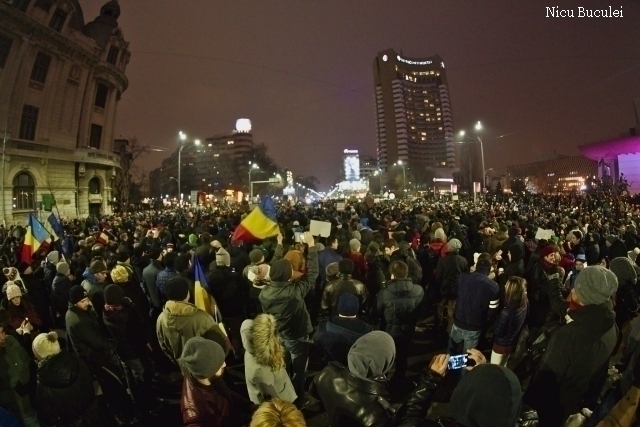Pros and Cons of Amending the Criminal Law
Bucharest and other big Romanian cities once again saw large-scale protests against the Government's plan to grant collective pardons and amend the criminal codes.

Bogdan Matei, 30.01.2017, 13:25
Fifty thousand
people took to the streets on Sunday night in Bucharest alone, and another
40,000 in cities across the country as well as in Paris and Brussels,
making this the largest-scale protests
in Romania since the early 1990s, right after the anti-communist revolution.
Once again, they demanded that the government appointed by the Social Democrats
and the Alliance of Liberals and Democrats in Romania give up the bills on
collective pardons and decriminalising a number of offences. One of the bills
grants full pardon for all prison sentences of up to 5 years, while the
detention period might be reduced by half for prisoners over 60 years of age.
Moreover, abuse of office may qualify as a criminal offence only if the damages
exceed the equivalent of 55,000 euros.
The Social
Democrat Justice Minister Florin Iordache claims that the changes are needed in
order to solve the issue of prison overcrowding and to bring the legislation in
line with certain Constitutional Court rulings. He has mentioned that Romania
has already been sentenced by the European Court for Human Rights for reported
inhuman detention conditions. In a statement on Radio Romania, Iordache
promised that the pardons would not cover sentences for corruption offences or
for violent crimes.
But the
arguments of the Justice Minister and of Prime Minister Sorin Grindeanu could
not convince the protesters. Firm and determined, although decent and peaceful,
the participants in the rallies, mostly young people, resumed the protests they
started a week ago, when some 30,000 people took to the streets of Bucharest.
Together with the mass media, civil society, the right-wing Opposition and
President Klaus Iohannis himself, people criticise what they see as an attempt
to clean the criminal records of politicians in the ruling alliance who face
corruption charges. Their outrage is fuelled by the fact that such amendments
to the criminal law were not included in the governing programme that won the
Social Democratic Party the parliamentary elections of December 11.
The media
supporting the Power in Bucharest first accused the protesters of attempting a
coup, and then even ridiculed them, writing that Romanians took to the streets
to celebrate the Swiss Roger Federer’s win in the Melbourne tennis tournament.
Analysts however note that the Government’s initiative is opposed by the
Superior Council of Magistracy, the Public Ministry, the National
Anti-Corruption Directorate and the Directorate Investigating Organised Crime
and Terrorism. As one observer put it, all of a sudden, the Social Democratic
Party is deeply concerned with the fate of prison convicts, although it had
stated that it wanted to rule in the name of people who are not prison
convicts.






























